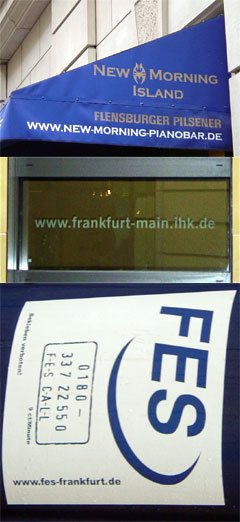Observations of German Domain Names
 As much as I write about domain names, it probably comes as no surprise I think about them and notice them more. On a recent vacation to Germany, I made many observations on them, and to the fortune of myself and my wife, they did not disrupt the trip. Well, not too much.
As much as I write about domain names, it probably comes as no surprise I think about them and notice them more. On a recent vacation to Germany, I made many observations on them, and to the fortune of myself and my wife, they did not disrupt the trip. Well, not too much.
One observation I made was the wide use of the German ccTLD of .de. A ccTLD is a country code top-level domain,. A top-level domain is commonly referred to as the domain name extension. Where .com, etc. can be used throughout the world, a ccTLD is ideally designated for an entity in a particular country. Most all of the observations I made of domain names had them ending in .de, both for German-based entities as well as international entities and brands. This was similar to the observations I made in Denmark the year before, where most all domain names ended in .dk.
I can see this for 2 reasons. The first is to direct a German language reader directly to German content on the Web site of an international brand. Have you ever gone to a Web site and the first thing you are presented with is a list of continents or countries for you to select before you get to any content? Identifying a user coming from Germany would lead them to German content, with the occasional option to select other languages. The second is national pride. It can be inferred that though .com is international, it originated in and is predominately used for US Web sites. It also adds a deeper level of identification that it is used by a German entity.
A second observation I made was the widespread use of dashes in domain names. I have a few photos of domain names in action, which represent only a handful of what I observed over the course of the trip. Where dashes can make for a more visually pleasing domain name display, it is easy to forget about them when recalling them from memory or when typing them. In the case of these particular names, a version of the domain names without dashes is not registered.
Whenever I work with a client to select domain names, I recommend they avoid dashes for the reason I mentioned above. I do have some clients who have them and use them, however they have been in use for many years, and in those cases alternate names redirect to the Web sites as well.
If anyone reading has any information or insight into the use of dashes in domain names in Germany, please comment to this post.
Domain Names • Technology • (14) Comments • Permalink
